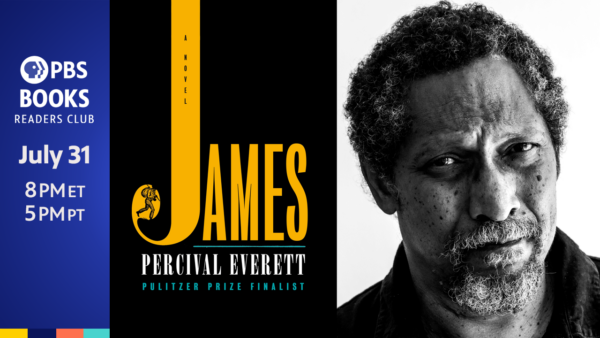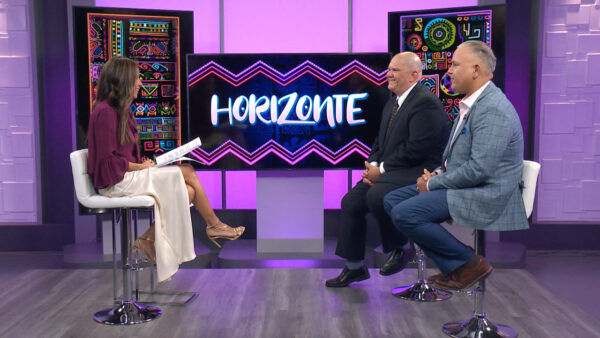Join us as we highlight local and national figures who have been on HORIZONTE in the past five years, including: Ray Suarez (The NewsHour with Jim Lehrer), Jorge Ramos (Univision anchor and author) and more. Also, we look back at valley culture and community stories that we have covered through the years.
José Cárdenas:
Good evening, I'm José Cárdenas, welcome to "Horizonte." The election for the nation's top office is less than two months away. Hear from Senator John McCain and Senator Barack Obama's campaigns and what they are doing to get people in Arizona to vote for their candidate. Also tonight, we celebrate "Horizonte's" five year anniversary. From in-depth discussions with national and local figures, to analysis of political and social issues, as well as covering arts, culture, and our community through an Hispanic lens. Join us as we look back on the past five years of "Horizonte."
Announcer:
Funding for "Horizonte" is provided by SRP. SRP's business is water and power, but our dedication to the community doesn't stop there. SRP: delivering more than power.
José Cárdenas:
If not for John McCain being from Arizona, it would likely be a swing state. But because he is an Arizona senator, many political experts expect Arizona to easily go with McCain on Election Day. McCain handily won Arizona's primary. However, there are still a number of registered voters who are undecided. This, along with turnout, could be a key factor in our state. Joining me to talk about efforts in Arizona for Barack Obama is Marco Lopez, Jr. Marco is representing the campaign. He is also the Director of the State Department of Commerce. Also here is Bettina Nava, Regional Campaign Manager for McCain '08.
José Cárdenas:
Thank you both for joining us on "Horizonte."
Marco Lopez:
Thank you.
Bettina Nava:
Thank you.
José Cárdenas:
You have been here before. We're delighted that you are back here for our anniversary show.
Marco Lopez:
Absolutely. Congratulations.
Bettina Nava:
Thanks.
José Cárdenas:
Marco, congratulations to you on your appointment as the Director of the Department of Commerce, recently announced. And I think this is your first week on the job.
Marco Lopez:
First week on the job. Thank you José.
José Cárdenas:
You are not here in an official capacity with the campaign, but you are a knowledgeable political observer. So tell us, how does the Obama campaign look in Arizona? Has he given up because of the "favorite son" status of Senator McCain and the likelihood that this will go for Senator McCain?
Marco Lopez:
I think that Senator Obama is not taking any state for granted, and that is the truth for Arizona. I think part of what we see in Arizona is that Senator McCain should be doing much better than he is doing currently. I think that when we look at the landscape of the state, we see a lot of independent voters, and we see that a lot of them have not decided yet who they are going to vote for. And I think that that is very positive news for Senator Obama. He is set up an office in Phoenix and in Tucson and very quickly here he will set one up in northern Arizona, in Flagstaff. What I think the bottom line is, is that people across Arizona tell me, and they tell our campaign, that they cannot understand, or they cannot take, another four years of the same Bush administration. That they see that McCain would be a continuation of that. So, people are worried about our economy, they're worried about the issues that are important to them, and that is why we remain competitive, even in Arizona, even in the home state of Senator McCain.
José Cárdenas:
Bettina, my guess is you have a much different opinion. But before we get to that, tell us a little bit what you are doing with the campaign, because you are very actively involved.
Bettina Nava:
Right. I have been with the senator for about 16 years in one capacity or another. I'm the Regional Campaign Manager.
José Cárdenas:
And what does that mean?
Bettina Nava:
With a team of people, and our focus is Arizona, New Mexico, and Utah. We are running very aggressive --
José Cárdenas:
What does it look like in Arizona? Is the senator where you would expect him to be?
Bettina Nava:
Sure, yes, you know, and just as Marco said, we are not taking anything for granted. John McCain has always earned every single vote from Arizonans that he has ever gotten and he has done it overwhelmingly in years past with 70% of the vote. So we're here, we have an office set up, we're conducting voter conduct on a daily basis. Essentially we're not sleeping, which is a lot of fun and we're happy to do to be getting the senator's message out, but do we overwhelmingly think that Arizona will vote for John McCain? Yes, we're confident in that.
José Cárdenas:
How big is his lead?
Bettina Nava:
Right now, the last poll I saw, which was done by a fine institution here, was about a 15-point lead, and we'll just continue to grow that, and get our early voters out, and then get our Election Day voters out, which are both ours.
José Cárdenas:
Now Bettina, a few months ago there was a major shake up in the McCain campaign nationally, Steve Schmidt came in to impose discipline, or this is what the articles have talked about, impose discipline, stick on message, and become much more aggressive. Did that have any impact on what you are doing in Arizona and the region that you are responsible for?
Bettina Nava:
It really didn't. It is so bizarre to read about the "major shake up." Steve had been on for quite sometime before, so to say he came in and was interjected at that point wasn't true. He had always been on. His capacity just sort of changed, because our campaign manager, essentially the day-to-day information, disseminating it, dealing with staff, essentially his duties were just kind of all over the map in the sense of he needed to really focus on messaging, and the senator, and getting the senator traveling out to the right places, so Steve really just helped get staff on message and that kind of thing and then grow our operation. It was something that we had all expected, yet in the newspapers they made it sound like a great big shake up and it was really all part of the next phase of the campaign, kind of unfolding.
José Cárdenas:
Marco, speaking of focus, the suggestion has been, and I think a lot of knowledgeable observers agree, that the Palin pick really distracted the Obama campaign, kind of knocked them off their stride, is that your assessment as well?
Marco Lopez:
I think what is important José is to recognize that what we're dealing with here is a national campaign between Senator Obama and Senator McCain, and we are going to be sure that the American people continue to understand that that's really the decision on November 4th. The decision is, do we believe that the loss of 600,000 jobs this year, is really -- does that mean that our fundamentals of the economy are strong, as Senator McCain believes. I don't. I don't think that a loss of 600,000 jobs this year points to a strong economy. I also don't believe that Americans earning $2,000 less today than they were earning eight years ago point to a strong economy. So, I think that this --
José Cárdenas:
Does offer that message for a while anyway. Recent events have focused back on the economy, and that seems to be the subject of discussion. But the Palin pick seemed to have thrown them off stride, do you think they have recovered?
Marco Lopez:
I think that we are back on message. Absolutely. We will continue to tell and speak with the American people on the issues that are important to them. Housing, we see what a disaster that we have because of the lack of federal reforms that have been put on the financial markets. Time and time again we have had the opportunity, the Senate has had the opportunity to tighten those controls, and under the Senate that Senator McCain was under, they failed to be responsible for the message. We're back on message. As we begin our final weeks into Election Day, we will see, you know, a shift, not only in the mood of voters across the country, but even here in Arizona, I think. I think it is shifting back our way.
José Cárdenas:
Bettina, how is the Palin pick gone over in Arizona? We have witnessed over the last years or so a fierce battle between Republican moderates and Republican conservatives, right wing of the party as evidenced by Randy -- election as chair of the party here over a McCain candidate. So how has the Palin pick affected any of that?
Bettina Nava:
It has been an excellent pick and I think it has gone over really well. A distinction that I want to make is, you know, they're smart, they're reading their polling, saying that John McCain is another four years of President Bush. When you look at John McCain, who has been the real reformer in the Senate, and you look at Governor Palin. I will take their collective knowledge, John McCain's, he's an American Hero, someone who loves his country, puts his country before his own self interest, I will take that knowledge and his 24 years of service over Senator Barack Obama's 145 days in the Senate. So the Palin pick has been a good one, it's been a good supplement. She has run budgets, she is an executor. It has really invigorated our base and it's also brought in a lot of people that might have been wondering where do I fit in? And they realize this kind of a pick is really an example of the kind of reformer that John McCain is, that his administration would be reflective of our communities, whether it is women or Hispanics or Democrats, because he has a history of actually reaching across the aisle and getting it done, rather than kind of an empty resume.
José Cárdenas:
The suggestion though is that that John McCain is not running right now, that the John McCain that ran in 2004 is different than the John McCain who is now running under the guidance of Steve Schmidt, or with his direction of the campaign, that the ads are more negative, that the tone of the campaign is more negative, and I want to talk about one of the ads. Is that a legitimate charge?
Bettina Nava:
No, it is the same American hero that has been running. Again, let's point to no resume on one side of the t-bar to campaign finance reform, immigration reform, and I know you want to get into all of these, so I don't want to steal what's coming down the pike, but it is the same guy, that again, he is a reformer. He cut government spending. He has taken the American tax dollars and given them back to the people rather than squandering it on big government. It is the same person.
José Cárdenas:
Marco, one of the ads that the Obama campaign has complained about is the Spanish language ad that they claim misrepresents his position on immigration reform.
Marco Lopez:
It really does. I think that part of the issue here is to try to distract the proponents of federal immigration reform and try to get us to forget that this is the same John McCain who was active with Senator Kerry -- Kennedy, I'm sorry, in proposing a good, solid immigration reform and then has abandoned that position. I think that that is the intent. We're going to be sure that people across this state and people across the country don't forget that this is the same senator who was right on the issue, but then when there was politically expedient, he shifted on the issue, and is now against his own bill that he authored and he proposed. I think that is the real message. To try to confuse us is one thing, to actually know for us that have been following immigration reform for quite sometime now, it is going to be much tougher. We are going to need a more different debate than confusing Spanish language ads.
José Cárdenas:
Bettina, what does the senator do to convince Hispanics who many pundits think are going to be the deciding vote in this election, that he hasn't abandoned his position on immigration reform. The Republican platform says nothing really about immigration reform. The Democratic one says some of those same tough messages about securing the borders and stuff, does at least say we need to have meaningful immigration reform and has a few lines about the kind of things that will be done, but that's not in the Republican platform.
Bettina Nava:
Voters are going to be smart enough to actually go back and look at the record. It's one thing to talk eloquently, it's another thing to have actually walked the walk.
José Cárdenas:
You're referring to Marco or Obama? Or both?
Bettina Nava:
[Laughter] And, you know, they have a lot of similarities, handsome, articulate, but when you really look -- people will go back and look at who has walked the walk and who is talking the talk. John McCain, he said you know what, in order to restore faith in the American public, we will have to go back and do a portion of the bill and in that bill we will have to go ahead and have a security portion, whether that is biometrics, and smart science, and invest in that, that is what we need to do to restore some public sentiment of feeling that we can move forward . Has he abandoned a worker program, I mean, this is a man we have all seen fight on the floor, nearly lose the Republican nomination over this issue, and now it is completely being distorted by the same campaign, by Barack Obama, who fell to union bosses and helped provide the poison pill--
José Cárdenas:
So you're saying that the ad is accurate --
Bettina Nava:
It was just the opposite.
José Cárdenas:
In your opinion.
Bettina Nava:
I'm saying -- yeah. That the ad is absolutely -- it was Barack Obama who was part of the group that provided the poison pill amendments to kill immigration reform when John McCain and Senator Kerry -- John McCain who has the history of reaching across the aisle and helping on this issue.
José Cárdenas:
Marco, if you have something quick because I --
Marco Lopez:
I just want to say indeed the difference isn't that Senator Obama has shifted on this important issue for the Hispanic community, but also for America. Senator Obama believes that we do need to have border safety and border security and we need to tighten our controls. At the same time he believes if he is going to stick to the issue, he is going to follow it through. That is the difference here. When it was convenient for Senator McCain to wrap up his nomination, he shifted on this issue. And that's, unfortunately, the image that we are not going to forget come Election Day.
José Cárdenas:
Where does this all play out in terms of the other western states? There are many observers who think that the election may come down to New Mexico and Colorado and that the senator has to take one of those states to win. First of all, Bettina, do you agree with that?
Bettina Nava:
I think there is a lot of different scenarios. I think that is one of them. The good news with McCain being from the Southwest and understanding Southwest issues, whether immigration reform, by the way, we welcome Senator Barack Obama now joining the immigration debate, because when it was going on, he didn't, and when he did, it was to kill the bill. McCain understands western issues. That is playing very well. I don't want to live by polls, because then you die by polls, but if you look at the up tick right now, we're doing well in New Mexico, the last -- poll we were up two. Same in Colorado. So we have a ground game in place, we're working hard, and it could come down to one of them --
José Cárdenas:
Let me switch to Marco because we're almost out of time. Marco, we have about 20 seconds --
Marco Lopez:
For both of those states we have great support, and we had a great convention in Colorado. So I think that we're not going to take any state for granted. We have a great strategy to get to 270 Electoral College votes that we need and we're going to take, I think both of those states are in play, and I think we are going to take them.
José Cárdenas:
It's so good to have you on for our anniversary show, you've been here before and we're very grateful. Hope to see you again soon. Thank you.
Marco Lopez:
Thank you.
Bettina Nava:
Thank you.
José Cárdenas:
"Horizonte" officially made its debut here on "Eight" five years ago today. The show has provided the forum for a perspective on issues facing and affecting the Latino community. It has brought viewers a comprehensive look at politics, public and social policy, along with culture. Here is a look back at some highlights for the first few years.
José Cárdenas:
Good evening, and welcome to our inaugural edition of "Horizonte," where we view the week's top issues through a Hispanic lens. Tonight we kick off our show with Governor Napolitano.
José Cárdenas:
What do you consider to be your number one priority for the Arizona Sonora relationship?
Janet Napolitano:
I think where we should be focusing on is commerce and trade and what I would loosely call cultural and tourism exchange. There is always a temptation to focus on solely the immigration issues, but those are controlled primarily by the federal governments of our respective countries. We need to focus on the areas where we can do the most good and have the most positive impact.
Henry Cisneros:
Do you think that it is, in some places, pretty sharp as in Arizona, where we have seen the vigilantes across the border, and some of the statewide measures targeted against immigrants beginning to rear their head again.
Mike Sauceda:
His first stop was at the Biltmore in Phoenix, where he met with local leaders and also held a meeting with several Mexican dignitaries and Arizona Governor Janet Napolitano. She later introduced him at a luncheon.
Janet Napolitano:
The President of Mexico: Mr. Vicente Fox.
Vicente Fox:
Again, thank you very much for this invitation, because this has been an important day for the relationship between Sonora -- Sonora, Mexico and Arizona.
Jeff Flake:
Right now we focus so much attention simply trying to catch those who are coming here to work, and that is 99.5% of those who are coming across the border are simply coming for economic reasons and we're focusing all of our attention on them. If we have a program for them to go into, a legal program, then they can go through the legal ports of entry.
Bishop Thomas Olmsted:
Sadly I see a departure not only of Hispanics, but others as well from the church. I think that is partly due to a culture that has less connectedness with the Jewish-Christian tradition that we have.
Richard Ruelas:
So I don't know if there'll be fallout. I think it is actually good to see competitive districts, or Latinos competing against each other in districts. It shows a mark of progress rather than just one token candidate in each district.
José Cárdenas:
We don't have any Hispanic Republicans though running in any of these districts, right?
Richard de Uriarte:
Well, actually, that is a 50% Democratic district now. I think Richard is right that as other components, Apache Junction and Gold Canyon, all that grows, there is going to be more Republicans, but as of 2000, it was a 50% Democratic, 28% Republicans.
José Cárdenas:
How Latin immigrants are establishing a lasting and growing presence unlike other immigrant groups. What did you mean by that? Is it the constant refreshment in terms of the numbers of immigrants?
Ray Suarez:
That is exactly it. If you graph the arrival pattern of every other major immigrant wave of the last 50 years, there's a run up, a spike, a subsidence and then an almost complete petering out. Whether it's Germans, Irish, Italians, Eastern European Jews, they all had a run up, a peak, a subsidence and then a diminishment to tiny numbers.
José Cárdenas:
You are one of the anchors of one of the most watched news shows in the country, in fact, in Miami, Houston, Los Angeles, out-polls, or out-draws, all of the major network news shows, and you have been described as one of the most powerful Hispanics in the country. What is your reaction to that?
Jorge Ramos:
I'm not sure if I'm powerful enough. I wish I could change the life of one of the -- immigrants by giving him a green card. I just simply can't. But what I can do is to voice their concerns.
Raul Yzaguirre:
-- It's an umbrella organization for about 300 and some-odd community-based organizations -- friendly house -- groups like that --
José Cárdenas:
All of which are based here in Phoenix.
Raul Yzaguirre:
Right, all of those who are affiliated with us formally.
Larry Lemmons:
There were many who served our country in World War II. But what you may not have heard about are the Hispanics who fought in the war from 1941 to 1945. Nearly 500,000 Hispanics fought in World War II, they served in the U.S. Army and Navy Air Corps. A book documents Hispanic men who served as pilots and air crew from Arizona.
Larry Lemmons:
Students from Carl Hayden High School's Underwater Robotics Team beat colleges and universities to win the Marine Advanced Technology Education Center's R.O.V. Competition in California back in June. R.O.V.'s, or Remotely Operated Underwater Vehicles, are tethered robots that dive below the surface of the oceans to work and explore the last frontiers on Earth.
Luis Valdez:
I was invited -- Gordon Davidson, our assistant director invited me to write a play about the history of Los Angeles, and I was aware of the sleepy lagoon case, and I was aware of the riots having read books, such as North of Mexico by Carey McWilliams.
Reporter:
It's a familiar scene in various parts of the Valley: immigrants standing along the street waiting for someone to drive by and hire them for day labor. For Chandler the scenario is a touchy one. Many of these immigrants don't cause problems, but some do. Immigrants harassing teenage girls on their way to and from schools led the city to target illegal immigrants in a now infamous round up back in 1997. About 500 suspected illegal immigrants were arrested with the help of immigration. But in the process, dozens of American citizens or legal immigrants felt harassed by police, which caused major headlines and headaches for the city.
José Cárdenas:
What is the purpose, what is the goal of Datos, which of course means data in Spanish?
Harry Garewal:
It's really to provide that data, the latest demographic information on the Hispanic community, primarily to the business community, and it's usually --
José Cárdenas:
And not just the Hispanic business community, we're talking about the business community at large, right?
Harry Garewal:
The general business community. Because the question has always been asked, "How can we market and what do Hispanics buy? How much buying power do they have? Where are they located?" Those kinds of questions. This is very helpful for anyone who is looking to do business in the Hispanic community.
Stella Pope Duarte:
In April I went to Boston and received an award by the American Association of Community Colleges, and that was a first-time award for Maricopa Community Colleges. I received the Outstanding Alumni Award. So I was very proud to go up there with my family and bring it back to Phoenix for the first time.
Nadine Arroyo-Rodriguez:
Within a week, 3 suspects were arrested and according to police, all three admitted to the crime, this possibly giving some closure to the families of the victims. But many in the area are asking questions about the future of their community, questions such as what happens now? Where do we go from here? Where does a community like Maryvale go from here, a community plagued with so much violence and crime?
Nadine Arroyo-Rodriguez:
Where does the Latino student population fit in all of this? Well, according to our experts, also at the bottom. Dr. Sybil Francis is also the senior advisor to the president of the Arizona State University Foundation. She says, nationally, Latino students not only lag behind other ethnic groups in completing high school, but for the few that do go on to college, the graduation rate is just as low.
Dr. Sybil Francis:
In terms of graduation rates, comparing Latinos to the rest of the population, is that they are half as likely to graduate from college, about 23% graduate from college versus about 47% of their white counterparts.
José Cárdenas:
Sounds of Cultura, SOC: at the end of each month we will tell you about upcoming community events you and your family can enjoy. Tonight, a celebration for the dead and the music and dance of Flamenco comes to the stage.
Nadine Arroyo-Rodriguez:
But as spooky as this may seem, it is really all about tradition.
Nadine Arroyo-Rodriguez:
Many believe Day of the Dead is the day of horror, ghouls, goblins, monsters, but in reality, Day of the Dead, or Dia de Los Muertos, is a Mexican celebration when many celebrate and remember loved ones who've died. They prepare special foods, decorate cemeteries and even have parades. It is their belief that the spirits of the dead come out and visit their families on October 31st and leave on November 2nd. Well here in the Valley many of these beliefs are kept alive.
Barbara Rodriguez-Mundell:
I want to engage our community in a continuous dialogue to tell me how well, or how not so well, the court is doing its job.
Alisa Valdes Rodriguez:
My books have sold in 11 countries around the world, including Korea and China, and Iceland, Finland, and I'm writing about American women who happen to have Spanish surnames.
Alfredo Gutierrez:
The level of rhetoric in this state, the hate-filled rhetoric I might add in this states has drawn attention from throughout the Spanish-speaking world, Arizona has symbolized what Mississippi was to African Americans to many, many Spanish language people both in this country and outside of this country.
Guest:
-- really a combination of probably about 40 international trips and a few domestic trips, and it is just an effort to really kind of show through, basically through photography and images, what is happening around the world and what some of the challenges are for different people, different cultures, different traditions.
Nadine Arroyo-Rodriguez:
This rookie is one of the Phoenix Suns rising players taking the Valley by storm, gaining more playing time and hanging with the best of them. He is Leandro Barbosa, one of five Brazilian players in the NBA and one of 15 Latinos playing professional basketball. We recently caught up with Barbosa during a practice session at America West Arena. We talked about his family, his dreams, about learning a new language, and his career.
Leandro Barbosa:
I love my first time I got here, I really love playing with the Suns. They give a lot of attention to me, they talk to me a lot, and I think that this is very good for me.
José Cárdenas:
Next week on our show we will share more highlights from the past few years on "Horizonte." That's all for us tonight. I'm José Cárdenas, you have a great evening.
Announcer:
Funding for "Horizonte" is provided by SRP. SRP's business is water and power, but our dedication to the community doesn't stop there. SRP: delivering more than power.
Bettina Nava: Regional Campaign Manager, McCain '08;




















